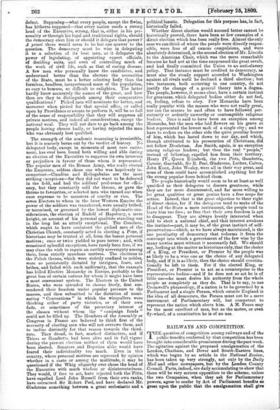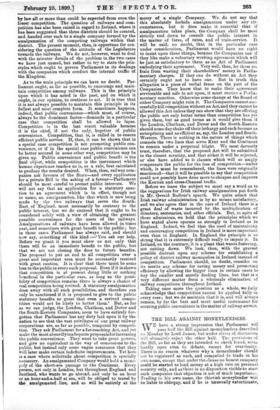RAILWAYS AND COMPETITION.
1HE question of competition among railways and of the public benefits conferred by that competition has been brought into considerable prominence during the past week. The agitation against the proposed amalgamation of the London, Chatham, and Dover and South-Eastern lines, which was begun by an article in the National Review, has been taken up very strongly, not only by the Daily Mail and other newspapers, but by the London County Council. Facts, indeed, are daily accumulating to show that there will be very serious opposition to the scheme, unless the two Companies, when they ask for Parliamentary powers, agree to confer by Act of Parliament benefits so great upon the public that the amalgamation shall give by law all or more than could be expected from even the freest competition. The question of railways and com- petition has also been raised in regard to Ireland, where it has been suggested that three districts should be created, and handed over each to a single company formed by the amalgamation of the competing railways within that district. The present moment, then, is opportune for con- sidering the question of the attitude of the Legislature towards the railways. We do not, however, want to deal with the minuter details of the problem in the two cases we have just named, but rather to try to state the prin- ciples which ought to govern Parliament in its dealings with the companies which conduct the internal traffic of the Kingdom.
As to the main principle we can have no doubt. Par- liament ought, as far as possible, to encourage and main- tain competition among railways. This is the principle upon which it has acted in the past, and on which it ought, in our opinion, to continue to act. It is true that it is not always possible to maintain this principle in its fullest and most complete form. It sometimes happens, indeed, that public convenience—which must, of course, always be the dominant factor—demands in a particular case that competition shall be allowed to lapse. Competition is in the last resort valuable because it is the chief, if not the only, begetter of public convenience. Competition, that is, is called in to ensure efficient public service. If, then, it can be shown that in a special case competition is not promoting public con- venience, or if in the special case public convenience can be better secured in some other way, competition may be given up. Public convenience and public benefit is the final object, while competition is the instrument which human experience teaches us is, as a rule, best calculated to produce the results desired. When, then, railway com- panies ask favours of the State—and every application for a private Bill is the asking of a favour—Parliament should be most careful to protect public interests. We will not say that an application for a statutory sanc- tion to an agreement which is in effect, though not in name, an amalgamation, like that which is now being made by the two railways that serve the South- East of England, must necessarily be contrary to the public interest, but we do contend that it ought to be considered solely with a view of obtaining the greatest possible convenience for the users of the railways. Amalgamations of railways have been allowed in times past, and sometimes with great benefit to the public ; but in those cases Parliament has always said, and should now say, something of this kind :—' You ask our help. Before we grant it you must show us not only that there will be an immediate benefit to the public, but that we are not closing the door to future benefits. The proposal to put an end to all competition over a great and important area must be necessarily received with great caution. It is clear that there must be some loss to the public in every such proposal. Even if it is shown that competition is at present doing little or nothing beneficial in the particular case, as long as the possi- bility of competition remains there is always a chance of real competition being revived. A statutory amalgamation does away with all such possibilities, and therefore can only be sanctioned if it is proposed to give to the public statutory benefits so great that even a revived compe- tition would not be likely to better them.' But, as far as we can judge, the London, Chatham, and Dover and the South-Eastern Companies, seem to have entirely for- gotten that Parliament has any duty laid upon it by the nation to see that the vast privileges of our great railway corporations are, as far as possible, tempered by competi- tion. They ask Parliament for a far-reaching Act, and yet make the most absurdlyinadequate proposals for increasing the public convenience. They want to take great powers, and give no equivalent in the way of concessions to the public, but instead only some vague assurance that they will later make certain indefinite improvements. Yet here is a case where solicitude about competition is specially necessary. An amalgamated Company would hold a mono- poly of the short-sea passage to the Continent. Every person, not only in London, but throughout England and Scotland, who wants to go abroad, and only be an hour or an hour-and-a-half at sea, will be obliged to travel by the amalgamated line, and so will be entirely at the mercy of a single Company. We do not say that this absolutely forbids amalgamation under any cir- cumstances, but it does make it essential that if amalgamation takes place, the Company shall be most strictly tied down to consult the public interest in the matter of fares, of rates, and of train-service. It will be said, no doubt, that in the particular case under consideration, Parliament would have no right to insist upon these things, because the Companies can if they like make a voluntary working agreement which will be just as satisfactory to them as an Act of Parliament embodying their agreement. Very well, then, let them re- frain from wasting their shareholders' money in Parlia. mentary charges. If they can do without an Act they certainly ought not to have one. But in truth this allegation is a piece of verbal fence on the part of the Companies. They know that to make their agreement serviceable and safe to act upon, it must receive a Parlia- mentary sanction. Otherwise some change at the Board of either Company might ruin it. The Companies cannot suc- cessfully kill competition without an Act, and they cannot be allowed this Act unless they can show that they are offering the public not only better terms than competition has yet given them, but as good terms as it would give them if the London, Chatham, and Dover and the South-Eastern should some day shake off their lethargy and each become as enterprising and as efficient as, say, the London and South. Western. There is nothing in the nature of things which compels the two lines that serve Kent and the Continent to remain under a perpetual blight. We most devoutly trust, therefore, that the proposed Act will be submitted to the closest scrutiny, and that either it will be rejected, or else have added to it clauses which will so amply compensate the public for the loss of competition—under which, it must be remembered, the lines were originally sanctioned—that it will be possible to say that competition could not possibly have done more to cheapen and improve the Kentish and cross-Channel traffic.
Before we leave the subject we must say a word as to the suggestions for Irish railway amalgamation put forth in Mr. Gerald Balfour's speech. We quite admit that Irish railway administration is by no means satisfactory, and we also agree that in the case of Ireland there is a great deal of waste incurred by the multiplication of directors, secretaries, and other officials. But, in spite of these admissions, we hold that the principles which we have stated above operate as strongly in Ireland as in England. Indeed, we feel that the need of maintaining and encouraging competition in Ireland is more important even than in England. In England the principle is so strong that it is extremely difficult really to impair it. In Ireland, on the contrary, it is a plant that wants fostering. not cutting down. We look, then, with the gravest possible distrust upon any scheme for establishing a policy of district railway monopolies in Ireland instead of competition. Parliament should, no doubt, consider on its merits any scheme for saving money and promoting efficiency by allowing the bigger lines in certain cases to buy the smaller and merely feeding lines, but that is a very different matter from a wholesale elimination of railway competition throughout Ireland.
Taking once more the question as a whole, we fully acknowledge that competition cannot be applied fully in every case; but we do maintain that it is, and will always remain, by far the best and most useful instrument for securing public convenience in the matter of railway service.







































 Previous page
Previous page